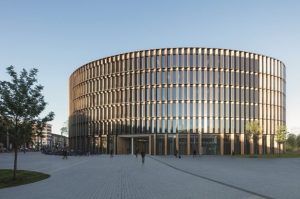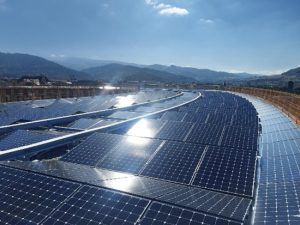
© HGEsch, Hennef
Stühlinger’s City Hall in Freiburg im Breisgau was completed in November 2017 as the world’s first public building with a net-positive energy balance. It has a gross floor area of 24,000 square meters and provides space for more than 800 municipal employees. What makes the new building special is that its solar system can produce more energy than the building needs itself. This means that this public administration building covers its own energy needs and also feeds surplus energy into the city’s power grid. All electricity and energy for heating and cooling are produced from renewable energies such as photovoltaics, solar thermal energy and geothermal energy.
Facts and Data

© Drees & Sommer
- In line with the strict criteria of the Passive House Standard, the primary energy requirement of City Hall for heating, cooling, ventilation and hot water production is around 45 kilowatt hours per square meter per year – equivalent to only around 40 percent of the primary energy requirement of conventional office buildings of comparable size. The thermal energy required for the building for heating and cooling is generated via suction and sip wells with a heat pump and solar thermal energy. Electrical energy is generated via photovoltaics on the roof and facade. The systems cover about 75% of the flat roofs.
- A total of about 800 solar panels are installed on the facade and roof. Data evaluation after commissioning and initial use has shown that the sustainable generation of energy, offset against the building’s actual consumption, does not result in any additional CO2 emissions. In fact, the building removes almost 10 tons of CO2 per year caused by other emitters. It therefore has a ‘climate-positive’ effect: it reduces its surrounding carbon CO2 footprint as much as 50 trees do.




